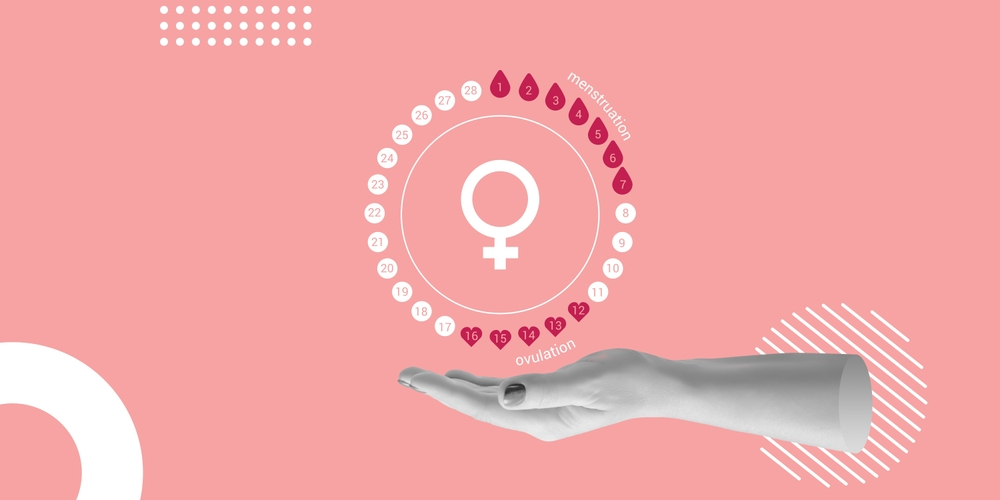- February 19, 2024
- by Harshita Bajaj
- Mental Health, Women
From mood swings to anxiety to depression, the monthly rollercoaster ride women are subject to is nothing short of a hormonal journey. Women go through many ups and downs every month which is challenging to say the least, but understanding how the menstrual cycle can impact mental health can be empowering.
Menstrual Cycle and Mental Health
The four phases of the menstrual cycle vary by the fluctuations in hormone levels i.e., estrogen, progesterone and testosterone, leading to changes in mood, energy levels and overall mental health.
The dates for each phase given below are an average and its important to remember that there are variations in cycle dates from person to person hence, it can be helpful to keep a track of your cycle dates.
Here are the psychological effects of menstrual cycle:
Menstrual Phase (1 – 5 days)
- During the time of the month, estrogen and progesterone levels are at their lowest. This means you may feel tired, irritable, emotionally drained or experience low moods.
- Its helpful to practice self-care during menstruation such as rest, hydration, and gentle exercise or physical activity.
Follicular Phase (6 – 14 days)
- With this phase comes a boost in estrogen levels, leading to a rise in energy and mood levels. You feel happier, energetic and inspired or creative. An increase in estrogen levels can also lead to a reduction in cortisol (stress hormone) levels, so you feel less stressed too.
- This is a good time to embrace new projects, socialize, engage in activities that bring joy.
Ovulation (around day 14)
- Ovulation is known as the peak of fertility and vitality. Estrogen levels are at their highestleading toto increased energy, confidence and libido. You may feel more social, outgoing and attractive during this phase.
- As estradiol (a type of estrogen hormone) is high during ovulation, it interacts with other hormones to increase your libido. Specifically, its interaction with insulin, leads to the body releasing more testosterone, which regulates the sex drive.
- This is a good time to connect with your body and your partner.
Luteal Phase (15 – 28 days)
- At this time the estrogen levels drop and progesterone levels rise, and further,progesterone helps the body make cortisol. This can trigger mood swings, high stress and irritability, anxiety and food cravings.
- During this phase, some women can experience Premenstrual Syndrome (PMS) or Premenstrual Dysphoric Disorder (PMDD), with sever mood disturbances and physical symptoms, these aspects are explored in detail below.
- Its helpful to prioritize self-care at this time, with stress management, healthy eating and adequate, restful sleep.
In addition to these menstrual cycle psychological effects, women can also experience changes in cognitive function and behavior, such as changes in concentration, memory and decision-making abilities during certain phases. Mental health may also be impacted by changes in appetite, cravings, and sleep patterns during menstrual cycle.
Severe Depression and Menstrual Cycle
Severe low moods, depressive symptoms, can be influenced by the menstrual cycle in some women, particularly during the luteal phase of the cycle. Herein come conditions and psychological symptoms that can severely impact mental wellbeing.
Premenstrual Syndrome (PMS) is a condition affecting at least 20% to 90% of menstruating women, ranging in severity and duration of symptoms experienced. It occurs before menstruation begins and includes mood swings, irritability, fatigue, bloating, breast tenderness, food cravings, abdominal or muscle pain, headaches, crying spells, sleep disturbances and a loss of appetite.
Premenstrual Dysphoric Disorder (PMDD) is a severe form of PMS which can impair daily functioning. According to research, it affects 3% to 8% of menstruating women, typically experienced in the week or two before menstruation begins and symptoms improve shortly after menstruation begins. It includes debilitating and severe depression, anxiety, irritability, mood swings, hopelessness, social withdrawal, changes in appetite, sleep disturbances, bloating, tenderness, headaches, muscle pain and suicidal ideation.
Its important to note that both PMS and PMDD are cyclical conditions, with different levels of severity that can impact daily functioning. Many mild or moderate PMS symptoms can be managed with lifestyle modifications and self-care strategies, but PMDD would require intensive treatment, therapeutic intervention and medication.
Menstrual Hygiene and Mental Health
Menstrual hygiene and mental health are connected in various ways as the menstruation experience can impact mental and emotional health. Have you wondered if your access to menstrual hygiene products was limited or you had to experience shame and stigma associated with menstruation?
Many women across the world face related issues as an addition to the pain, discomfort, menstrual disorders and psychological effects of menstruation and the cycle. It is important to inculcate and pass on a positive attitude towards menstruation to empower individuals with necessary information and also enhance menstrual health.
Access to menstrual hygiene products, practicing good menstrual hygiene and a positive attitude towards menstruation are three key factors that can empower you to embrace and connect through a shared experience and positively impact your mental health.
It’s important to recognize that psychological effects are a part of the menstrual cycle with many ups and downs. However, by embracing the cyclical nature of your body, you can cultivate a lifestyle that honours your body, mind and spirit, fostering self-awareness and self-care, promoting connection with self and others.
At North America Behavioral Health Services, we understand that talking about menstrual health is important as it impacts how you feel in the long run. Reach out to us and we can help you connect with professionals who will help you navigate this better!
















